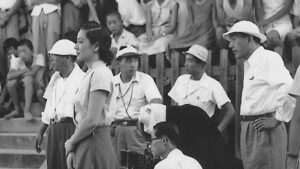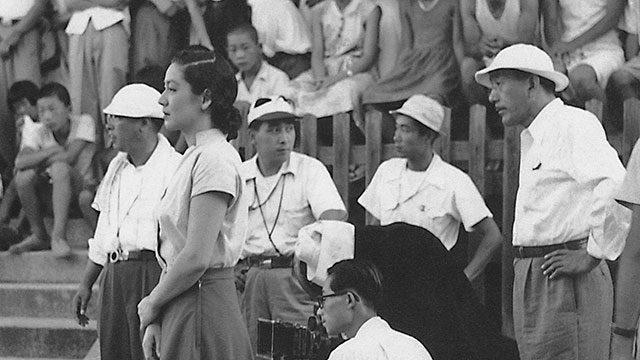Asian cinema has been in the spotlight for some time now. After the success of Bong Joon-ho’s Parasite, the talented Chinese director Chloé Zhao won an Oscar for her Nomadland. In the field of television series, Korean dramas have been steadily growing in popularity and now Squid Game cemented the Western focus on Asian production.
So we compiled a list of iconic Asian movies for the cinephile that’s looking forward to spending some time comfortably snuggled with a blanket and a cup of hot chocolate in front of the TV during the holidays.
1. The Flavor of Green Tea Over Rice (お茶漬けの味)
Director: Yasujirō Ozu
Year: 1952
 Watching an Ozu movie is an entirely different experience from watching the next Holywood big hit. It’s more akin to meditation. Nothing really extraordinary happens but it makes you contemplate and it makes you feel. If you have an eye for Japanese minimalism—your senses will feast on every frame. I won’t get into details about the synopsis, I’ll just tease your imagination saying that this movie is humane, warm, and it sends you back to a time when relationships weren’t something you “swiped left” if it wasn’t perfect. It is about the simplest things in life that bring us together. And the winter holidays are an especially good time to see it. Take the time, mute your smartphone and enjoy it with your closest people.
Watching an Ozu movie is an entirely different experience from watching the next Holywood big hit. It’s more akin to meditation. Nothing really extraordinary happens but it makes you contemplate and it makes you feel. If you have an eye for Japanese minimalism—your senses will feast on every frame. I won’t get into details about the synopsis, I’ll just tease your imagination saying that this movie is humane, warm, and it sends you back to a time when relationships weren’t something you “swiped left” if it wasn’t perfect. It is about the simplest things in life that bring us together. And the winter holidays are an especially good time to see it. Take the time, mute your smartphone and enjoy it with your closest people.
A translator’s point of view:
We’ll ask you to carefully pay attention to how flavor, taste, and smell are masterfully intertwined in this movie (and many other Ozu movies, for that matter). Food can often be related to family, and especially in this one, you’ll see it as a symbol of intimacy, too. Food in Japan has a special place and there are a few scenes in the movie where you’ll find that Mokichi Satake and his wife Taeko share the smell of food.
And what does translation have to do with it? A good translation transmits it all—cultural layers, linguistic expressions, and all that goes with it.
2. Still Walking (歩いても 歩いても)
Director: Hirokazu Kore-eda
Year: 2008
This one is in the top 5 of my favorite movies. Many view Koreeda as the new Ozu – and there are certainly similarities—but his work would be a bit easier to relate to since he’s working in the present time, rather than post-WW2 Japan. Still Walking is a masterpiece of a family drama painting a heartfelt portrait of a family over the span of 24 hours. It is a window into a traditional Japanese home, every part of it shown tastefully and aesthetically. The holidays are an especially good time to see the movie as it will certainly make you appreciate the time spent with your parents or extended family for that matter.
A translator’s point of view:
Some aspects of his movies are sometimes lost in translation simply because they are purely cultural things imbued in the language. There are many cases in Kore-eda’s movies (and not only) where emotions are buried deeper and not manifested verbally and directly as we are used to in the West. Emotions in Japanese society run deep but most of the time they are communicated very subtly. It is important to recognize this way of expression so it is not mistaken for lack of emotions.
3. Yi Yi (一一)
Director: Edward Yang
Year: 2000
It’s hard to put into words this Taiwanese family drama that has gotten a number of awards and nominations from prestigious film festivals all over the world. The struggles of each member of a Taiwanese middle-class family transcend the national and cultural boundaries—in the end, everything boils down to human all too human. The movie manages to bring up so many topics through the eyes of every character that each one could make a film by itself. Regret, modernity, coming of age, old loves, it’s all in there. Jonathan Chang, playing the adorable 8-year-old Yang-Yang, does an amazing job and brings so much to the movie. Through his character the common focal point of all these topics becomes evident—the human struggle to step out of our own shoes in order to see our own lives clearly. Or how the little boy would put it “to see the backs of our own heads”.
A translator’s point of view:
The title in Chinese is “一一” (pinyin: Yī Yī) and literally means “one one”. It is translated as “one by one” but when written vertically the two strokes resemble the character for “two” (二), hence the subtitle “A One and a Two”.
4. Taste of Cherry (طعم گیلاس)
Director: Abbas Kiarostami
Year: 1997
This movie is a journey. Traveling and long shots with moving vehicles are something of a trademark for Kiarostami (like in The Wind Will Carry Us for example). And, to be frank, it is demanding. It demands first that you acclimate yourself to the slow pace and then it demands that you do some mental work. The topic is certainly controversial—it’s suicide (“Why would I watch such a movie, during the holidays at that?” I hear you asking). Let me explain. The movie invites us to think about this painful but relevant topic in generality, abstractly. This is possible due to the complete lack of backstory and reasoning of the main character—it could be anyone, the reason could be anything. This allows the viewer to think rationally without being emotionally attached to the character. Why should we do it? Well, not thinking and not talking about a painful issue doesn’t make it go away. Moreover, the movie gives us some simple (almost primitive) wisdom and some hope. So I invite you to take up the challenge and give it a try.
A translator’s point of view:
There are many different approaches to translating a movie name and one of them is the literal translation. And Taste of Cherry is a very fine example of that. True to our purpose to show off cultural differences here I share a curious fact about the movie and Kiarostami: in 1997 he was awarded the Palme d’Or—what was seen at the time as the highest point in the director’s carrier in the West—in his own country the focal point was on a completely different aspect. There was outrage about something we wouldn’t even pay attention to. He kissed Catherine Deneuve on the cheek, which is unacceptable in his own society for an unmarried man.
5. Pather Panchali (পথের পাঁচালী)
Director: Satyajit Ray
Year: 1955
To be honest, I am a bit biased towards Indian movies, which is silly. One has to keep an open mind since not all of them (obviously) are Bollywood-style dancing and singing soap operas. Pather Panchali is the ultimate coming-of-age story. The main character of the movie is little Apu – the second child of an impoverished family. His relationship and shared childhood experiences with his older sister Durga are the heart and soul of the film. For the movie nerds out there it will be curious to see many camera techniques that have inspired generations of directors afterward being used for the first time. For the rest of us remains the heartfelt story of a world seen through a child’s eyes, a world of struggles and dreams.
A translator’s point of view:
Did you know that the movie was based on an eponymous book that is considered a Bengali classic? Well, I am here to surprise you because the book is quite different from the movie and there was a recent effort to translate it into English. I have to share an article here because it would take entirely new material to cover the topic. The article tackles the challenges of translating the book from the first point of view. Enjoy!
Conclusion
In this article, I’ve strayed away from the more popular titles such as Kurosawa’s Seven Samurai and Rashomon or Miyazaki’s Spirited Away and Princess Mononoke. If you haven’t watched them, do yourself a favor and enjoy them! I hope you’ll find something of value in my recommendations and let’s strive to discover and embrace new experiences and broaden our horizons in the coming year, since “The very basic core of a man’s living spirit is his passion for adventure.”
